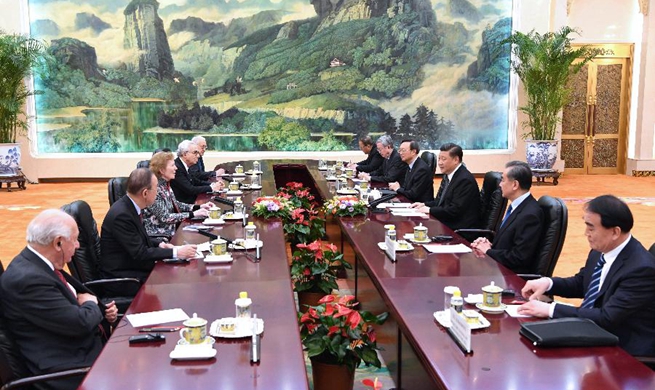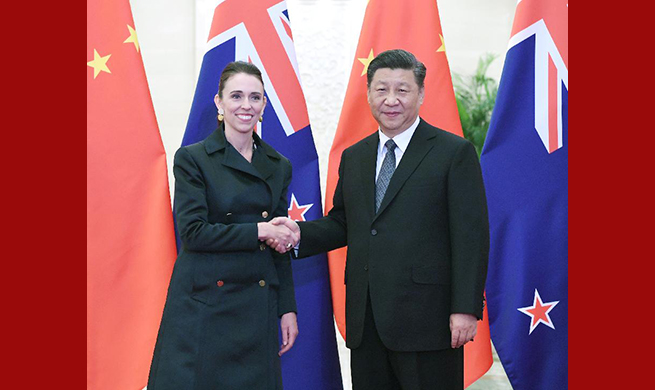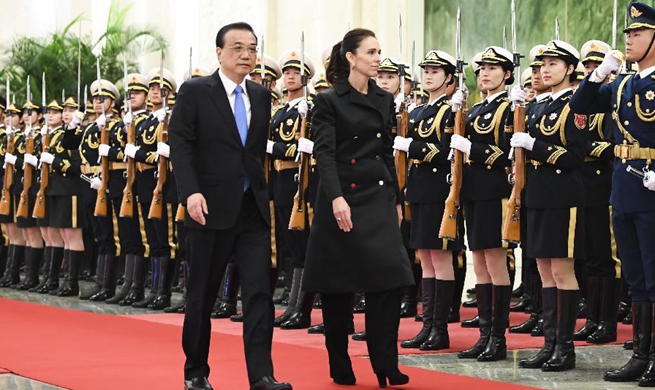LONDON, April 2 (Xinhua) -- British Prime Minister Theresa May has to consider what next steps she and her government will take on Brexit after lawmakers on Monday night rejected for a second time an alternative list of options aimed at breaking the current Brexit deadlock.
With Britain scheduled to leave the European Union on April 12, May is expected to convene a cabinet meeting on Tuesday. Her mission will be to seek a way of breaking the impasse between warring politicians.
May is expected, trying for a fourth time, to get her under-fire Brexit deal through parliament later this week. Her deal, also known as the Withdrawal Agreement, has been rejected in the House of Commons for three times since January.
Members of Parliament spent hours Monday debating a list of four Brexit options, ending in a series of votes which resulted in all of them being rejected.
It was the second time within days that the British parliament had taken the unusual step of taking control of business in the Commons, a task usually managed by the ruling government.
The first round of unbinding "indicative vote" was conducted on March 27, in which none of MPs' eight proposed options secured a majority, but among them, the proposed options about a customs union with the European Union and a referendum on any deal received most support from the lawmakers.
Many of those options have returned for round two, but some have been replaced with new alternatives.
The prime minister, who is struggling to hold her party together, warned Sunday night that she faced resignation and a split in the Conservative Party if she agrees to pursue a "soft" Brexit this week.
PROPOSED OPTIONS
Speaker John Bercow announced the results of the four options, which one by one fell, giving May's own deal a better chance.
One option put forward by veteran Conservative Ken Clarke, the longest serving politician in the Commons, lost by just three votes, with 276 MPs against it and 273 backing.
It would have seen Britain negotiating a permanent UK-wide customs union with the EU as part of any Brexit deal with Brussels. But it would prevent Britain striking independent trade deals with other countries, and has previously been ruled out by May.
Conservative MP Nick Boles' Common Market option lost by 282 to 261. It would have seen Britain joining the European Free Trade Association and European Economic Area. It would have meant Britain remaining part of the EU single market, but would allow free movement of people across Europe. Boles announced he was resigning from the Conservative Party after the Norway-style Brexit option was rejected.
Labour MPs Peter Kyle and Phil Wilson put forward a plan that would have forced a public vote on any Brexit deal passed by the British Parliament, before it could be implemented. It lost by 292 votes to 280.
Scottish National Party MP Joanna Cherry's option aimed at preventing Britain from leaving the EU without a deal, lost by 292 votes to 191, a margin of 101.
None of the Monday votes on the proposals are legally binding, meaning it will be up to the British government if they act on the results.
DEAL OR NO DEAL
Currently, Downing Street does not rule out the plan to seek a fourth parliamentary vote on May's Brexit deal, reached between London and Brussels in November 2018 after long painful negotiations.
British Brexit Secretary Stephen Barclay told MPs after the results were announced Monday that the House of Commons could avoid a no-deal Brexit, and avoid having to hold European elections, by voting for May's deal this week.
"This is now the second time the House (of Commons) has considered a wide variety of options for a way forward. It has once again failed to find a clear majority for any of the options," he said.
"And yet the result of the House on Friday not to endorse the withdrawal agreement (May's deal) means that the default legal position is that the UK will leave the EU in just 11 days' time," he said.
It was not a message many of the MPs wanted to hear. Last week's third defeat for May's deal saw her losing by 58 votes, closer to the finishing line than the previously losing margins of 230 and 149 respectively. But still a wide gap to bridge.
Veteran Labour politician Hilary Benn, chair of the House of Commons Brexit committee, said he wants to know if May plans to ask Brussels to extend the April 12 deadline.
The focus now switches to Downing Street and Tuesday when the British cabinet meets. It had been predicted that ministers might debate whether there should be a general election as a way forward. That so-called nuclear option may now be put on hold following the results Monday.
As one leading political commentator speculated, May "may now go for meaningful vote four, or even five."
European Union leaders have given Britain until April 12, the latest Brexit date, to agree a deal, or else leave the regional bloc with no deal. That would mean Britain trading under the World Trade Organization rules. A special summit of EU leaders has been scheduled for April 10 to discuss the Brexit saga.
There was cold comfort from across the English Channel, according to the Guardian in London. It reported that the European Parliament's lead Brexit spokesman Guy Verhofstadt, said on his social media site after the Monday night results that a no-deal Brexit was "nearly inevitable."












